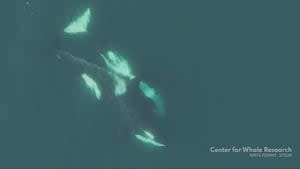Killer Whales Engage in Unprecedented Allogrooming Behavior: First Marine Species to Use Tools for Non-Food-Related Purpose

In a remarkable discovery made by the Center for Whale Research in Washington, researchers have observed a unique behavior among killer whales. For the first time, a marine species has been documented using and creating tools for a non-food-related purpose. The finding, which was made between April and July 2024, would not have been possible without the diligence of the researchers. The behavior, which has been dubbed "allogrooming," involves a whale cutting a piece of kelp loose and pinning it on another Orca, then rotating its body to roll the kelp on the other whale. In some instances, the other Orca returns the favor. While the researchers have not been able to definitively show the purpose of this behavior, they theorize that the whales use kelp to care for each other's skin. "This is a major part of their social lives... we are now seeing this behavior more times than we are not," said Dr. Michael Weiss, a researcher at the Center for Whale Research. "It's also a case of tool manufacturing or tool fashioning. Both of those things are quite rare in animals generally and particularly rare in marine mammals." The discovery was made thanks to new drones the Center acquired after a grant from the Rose Foundation. The researchers have continued to study this behavior, as well as other aspects of killer whales. So far, it is almost certainly a learned behavior that is distinct in the J, K, and L pods that make up the Southern Resident Orcas. The transient Biggs Killer Whales that migrate through the Puget Sound and Salish Sea do not exhibit the same behavior, despite cutting kelp free and moving through bull kelp forests. "We also want to look over time to see if whales who do this behavior together are more likely to then show other kind of cooperative behaviors, like hunting together and sharing food and other forms of social interaction to really demonstrate more clearly whether or not this behavior helps build social bonds," said Weiss. The Center for Whale Research is a non-profit organization predominantly supported by public donations. The discovery of this unique behavior among killer whales highlights the importance of continued research and observation in understanding the complex social dynamics of marine species. For more information on the Center for Whale Research and its work, visit their website.
This study revealing killer whales engaging in unprecedented allogrooming behavior, making them the first marine species to utilize tools for purposes unrelated to food-gathering expands our understanding of intelligent and socially complex animal behaviors.
The discovery of killer whales engaging in unprecedented allogrooming behavior, marking the first instance where a marine species uses tools for non-food related purposes underscores their uniquely advanced social skills and cognitive abilities.







![Isothermal Bags Containers Market [2028]: Top Trends, Size, and Competitive Intelligence - TechSci Research](https://antiochtenn.com/zb_users/upload/2025/07/20250719012446175285948669203.jpg)






